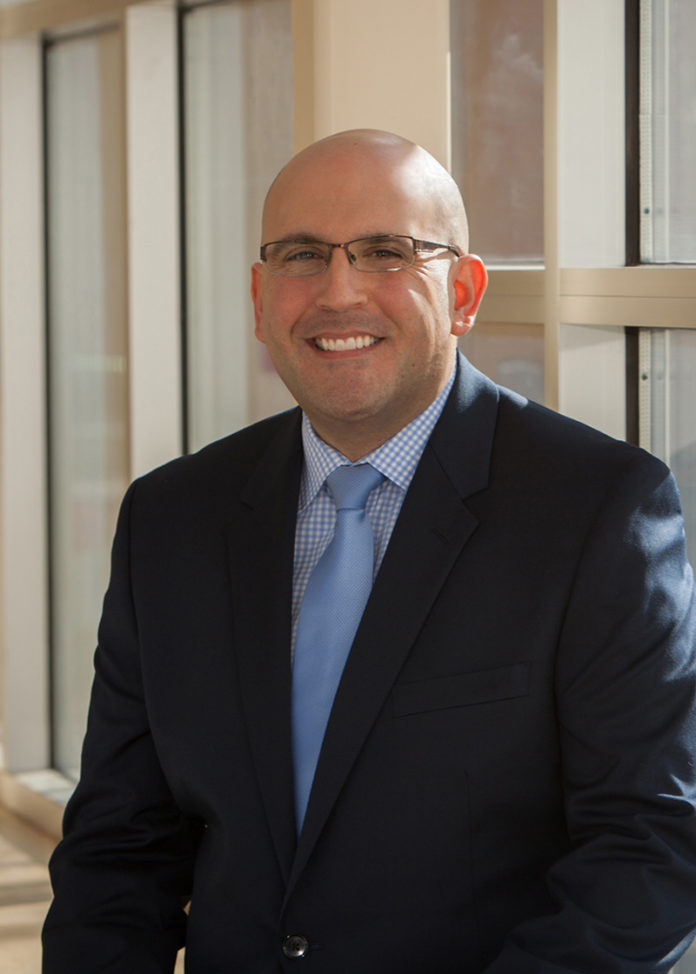Michael Souza joined Landmark Medical Center as its chief executive officer earlier this spring, after serving as president of the Hospital Association of Rhode Island. Landmark Medical Center is a Woonsocket-based acute care hospital that is owned by Prime Healthcare Services Inc., a for-profit company based in California, which also owns the Rehabilitation Hospital of Rhode Island in North Smithfield.
Souza talked with Providence Business News about his new role at Landmark Medical Center and Prime Healthcare Services’ intention to convert Landmark Medical Center to a nonprofit entity.
PBN: What motivated you to leave your position as president of the Hospital Association of Rhode Island to become CEO of Landmark Medical Center?
SOUZA: Though my tenure at HARI was very rewarding, the opportunity to move back to hospital operations at the most senior level is appealing to me.
PBN: What do you see as your primary goals and objectives during the next six to 12 months as CEO of Landmark?
SOUZA: In a short amount of time as CEO at Landmark, I’ve been involved in major initiatives that will advance the scope of services in the community. The common thread through all of our initiatives is patient safety, quality outcomes, retaining talent and maintaining financial stability. The recent approval of the Certificate of Need (issued by the R.I. Department of Health) for a new Trauma Center is at the forefront as a major strategic initiative that will definitely have a positive impact on regional health care.
PBN: As CEO of a hospital owned by a larger, out-of-state entity, how much autonomy do you have and who ensures that Landmark’s goals and objectives are aligned with those of Prime Healthcare Services?
SOUZA: As with major corporations, local entities adhere to the corporate guidelines and roadmaps for success. A community hospital delivers care locally. Therefore, the majority of our operational decisions are made at the local level. Thankfully, we benefit from Prime’s corporate infrastructure and commitment to best practices. Prime has been named a “Top 15 Health System” by Truven, and Prime hospitals are consistently among the “Top 100 Hospitals” in the country. This distinction allows the local hospital leadership to benchmark our performance with our Prime colleagues on a national level.
PBN: Prime Healthcare Services recently announced its desire to convert Landmark Medical Center from a for-profit entity to a nonprofit. Assuming the conversion is approved by the relevant regulatory authorities, what are the pros and cons associated with such a conversion for the hospital itself, its employees and patients, and the community of Woonsocket, which would lose significant tax revenue?
SOUZA: While our conversion to a nonprofit organization will not change the way we deliver care, it will provide benefits in the areas of loan forgiveness for new physicians with overwhelming debt, as well as a pharmacy program that will reduce the cost of certain medications and formularies. As a nonprofit entity, we’ll have the added value of being eligible for state and federal grants as a way to expand and innovate services.
PBN: Assuming the conversion is not approved, what do you anticipate Prime Healthcare Services will do regarding Landmark Medical Center – will it keep the hospital, put it up for sale, close it or take some other action?
SOUZA: Prime Healthcare Services has never closed or sold one of its hospitals. In fact, Prime’s motto is saving hospitals, saving jobs and saving lives. This is best illustrated by the millions of dollars Prime has invested in its 44 hospitals and the communities they serve. Were it not for Prime, many of these hospitals would have closed their doors.
Nancy Kirsch is a PBN contributing writer.













